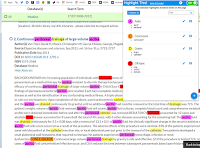 Things about Prof Illingworth (our namesake)...
Things about Prof Illingworth (our namesake)...We had an email this week from Kate Statham (Communications/Events Co-ordinator at Western Bank Library) she said this:
I work for The University Library at The University of Sheffield and I am currently involved with organising The Sheffield Authors Showcase, which celebrates publications by some of the universities leading academics.
As part of this, we are filming a short documentary on the following book - Ronald Illingworth: The Normal Child
I am looking for interviewees, who have read this book or have some interest in this subject/Ronald Illingworth.
If you would like to help Kate please email her
Things for keeping quiet...
 If you are studying or working in the library and do not want distractions, please request our ‘Do Not Disturb’ notice. Place it on the back of your chair or on the desk and it’s clear to others that you are here to work.
If you are studying or working in the library and do not want distractions, please request our ‘Do Not Disturb’ notice. Place it on the back of your chair or on the desk and it’s clear to others that you are here to work.Things not to keep quiet...
There is still time to sign-up for our next conversation opportunity in February's Randomised Coffee Trial.
Thank you to all of those who have already signed up i will be matching next week so click on the link to find out more.
Things that might confuse you...
 The National Library of Medicine (whose classification system we use) has recently overhauled the paediatric numbers it uses. This is actually a great improvement as now more of the paediatric books will be close together and subjects like childhood asthma and obesity have new numbers in the paediatrics section of the library (books with spine labels beginning WS)
The National Library of Medicine (whose classification system we use) has recently overhauled the paediatric numbers it uses. This is actually a great improvement as now more of the paediatric books will be close together and subjects like childhood asthma and obesity have new numbers in the paediatrics section of the library (books with spine labels beginning WS)We are gradually moving these books around and relabelling them so if you go to the shelf for a favourite book and it isn't there please ask library staff to help you or search our library catalogue for the new number.
Even if the books you use haven't been given new numbers you may find they have moved several shelves to the left in order to make room for some of the others...we are sorry about this as we know how irritating it is when supermarkets change where things are kept...but you never know you might just stumble across something interesting which you wouldn't have otherwise found.
Things about inpatient mental healthcare...
Things to access and read...
People sometimes forget we have e-books available to you via your NHS Athens login. They can all be found via our library catalogue. The most used titles at the moment are:
- Training in Paediatrics
- Lovell and Winter's Pediatric Orthopaedics
- Operative Pediatric Surgery
- Anxiety in Children and Adolescents with Autism Spectrum Disorder : Evidence-Based Assessment and Treatment
- Essentials of Audiology
If there are books which you think would be useful as e-books for you or your team please contact us and we can consider buying them.
These three courses from ScHARR are available to book
Systematic Reviews and Meta-analysis
3 day course: Tuesday, 26th - Thursday, 28th March 2019
The Early Bird Rate for this course will automatically close at 11pm on Sunday, 27th January 2019 Here is the link to the full course information, including fees:
How to Quickly Synthesise Research
1 day course: Tuesday, 12th February 2019
Bookings for this course will automatically close at 11pm on Wednesday, 29th January 2019. Here is the link to the full course information, including fees:
Utility Data for Health Technology Assessment
2 day course: Monday, 11th - Tuesday, 12th March 2019
Bookings for this course will close automatically at 11pm on Monday, 25th February 2019 Here is the link to the full course information, including fees:
Things about child health...
 This report from RCPCH on 'State of Child health: England - two years on' congratulates the Government on its commitment to child health, commending them on bold pledges in areas such as obesity, mental health and the integration of children’s health services. However, the scorecard also reveals that England continues to lag behind other Western European countries on a range of child health outcomes and notes areas for improvement, particularly in universal public health provision, including: reducing child poverty and inequality; child deaths; tobacco and alcohol control and breastfeeding.
This report from RCPCH on 'State of Child health: England - two years on' congratulates the Government on its commitment to child health, commending them on bold pledges in areas such as obesity, mental health and the integration of children’s health services. However, the scorecard also reveals that England continues to lag behind other Western European countries on a range of child health outcomes and notes areas for improvement, particularly in universal public health provision, including: reducing child poverty and inequality; child deaths; tobacco and alcohol control and breastfeeding.A recipe from Kate this week for Peanut butter chicken...apparently yesterday was Peanut Butter Day!























